The last days: hunger stalks Zimbabwe as Mugabe clings on
Stricken by drought and political paralysis, Zimbabwe is bracing itself for a succession struggle that could spark civil war
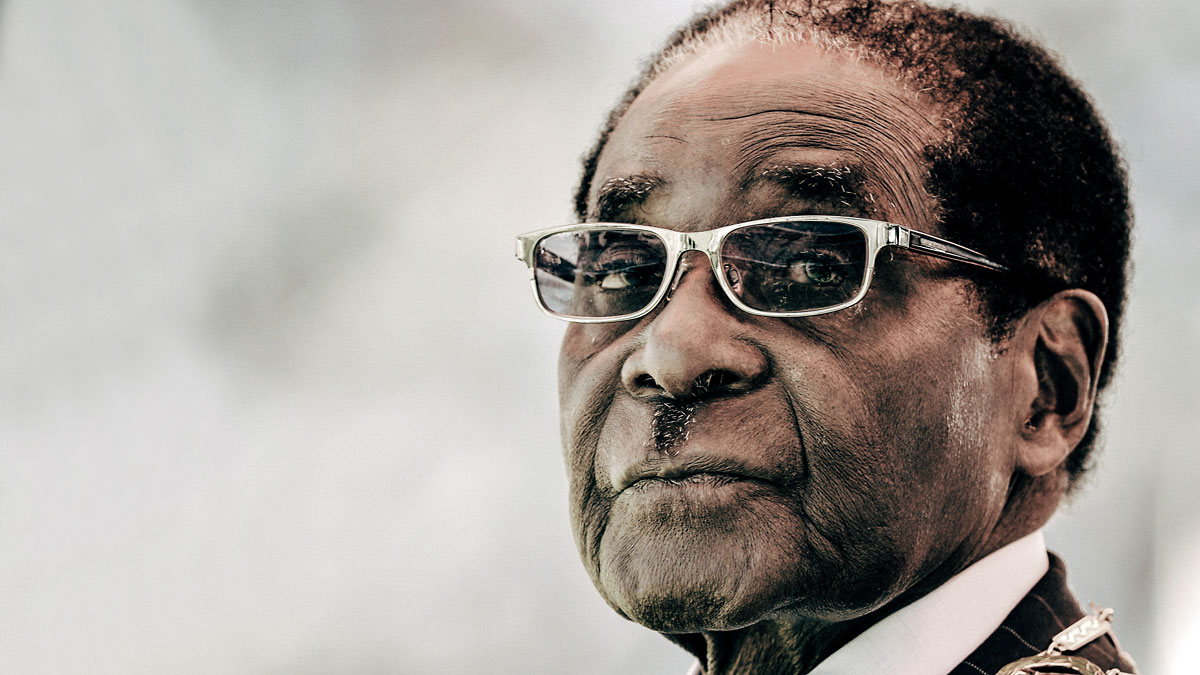
A free daily email with the biggest news stories of the day – and the best features from TheWeek.com
You are now subscribed
Your newsletter sign-up was successful
by Mxolisi Ncube
As Robert Mugabe's long reign approaches its twilight years, Zimbabwe has little to celebrate. In fact, the country is tilting back towards the abyss.
A deteriorating political climate, a downward economic spiral aggravated by severe drought, and the government's iron-fisted response to dissent are once again intruding upon the lives of Zimbabweans. Wages have gone unpaid, splits are appearing in the security services and fears are growing of a military revolt. A quarter of the population is hungry.
The Week
Escape your echo chamber. Get the facts behind the news, plus analysis from multiple perspectives.

Sign up for The Week's Free Newsletters
From our morning news briefing to a weekly Good News Newsletter, get the best of The Week delivered directly to your inbox.
From our morning news briefing to a weekly Good News Newsletter, get the best of The Week delivered directly to your inbox.
While some in the opposition hope that Mugabe's increasing frailty will force him to relinquish power – and others privately rejoice at frequent false rumours of his death – many also fear that his departure will unleash a violent succession struggle.
"Amid escalating factional fighting over who to succeed him, the government has been in a state of paralysis, unable to focus and operate effectively due to factionalism," says Dewa Mavhinga, a Southern Africa researcher at Human Rights Watch.
With government ministers accusing each other of treason, and Mugabe himself talking up divisions within his armed services, fears abound that deepening fissures within the ruling Zanu-PF party may lead to civil war. And analysts warn that the crisis in the former British colony may soon metamorphose into a regional security threat across southern Africa.
A house divided
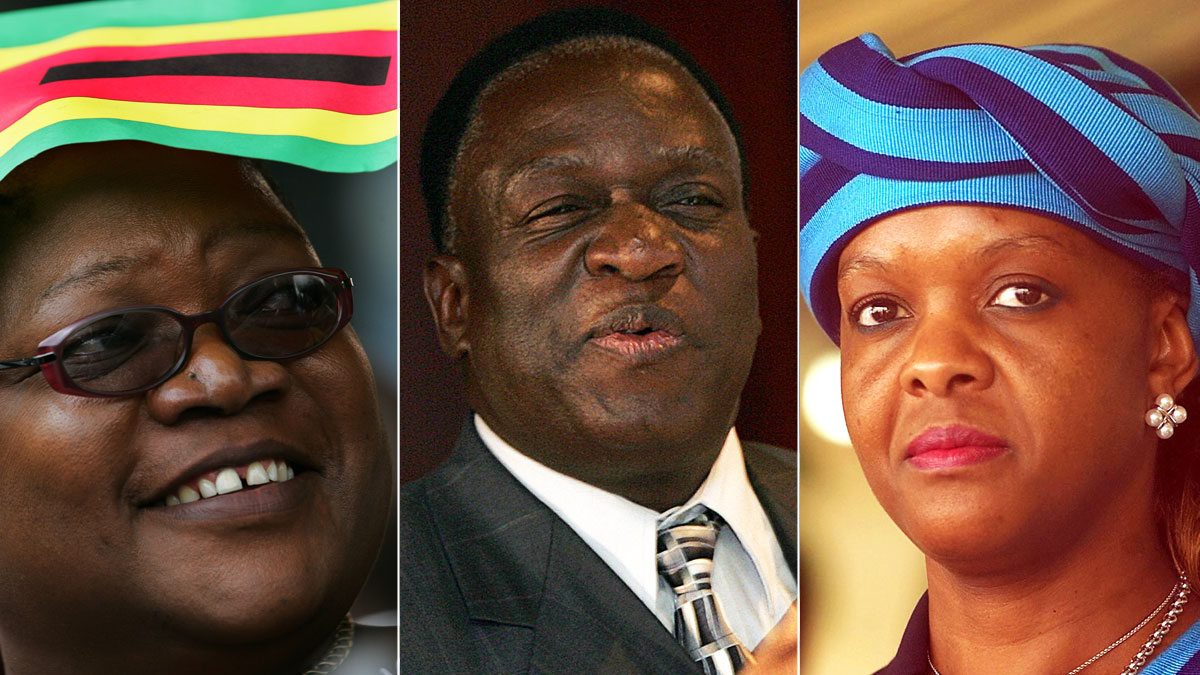
The leaders of three Zanu-PF splinters: from left, Joice Mujuru, Emmerson Mnangagwa and Grace Mugabe (AFP/Getty)
A free daily email with the biggest news stories of the day – and the best features from TheWeek.com
Infighting within Zanu-PF, which has ruled the country since it gained its independence from Britain in 1980, has its origins in the rise and fall of the Movement for Democratic Change, which emerged as the first credible alternative to Mugabe's rule in 1999.
The party split in 2005, but a splinter group known as the MDC-T, led by founding party leader, Morgan Tsvangirai, handed Mugabe and Zanu-PF their first ever electoral defeat in round one of the 2008 presidential election. However, though Tsvangirai claimed to have won an overall majority, the results – which were officially withheld for a month – placed him just short of the 50 per cent target, resulting in a presidential run-off against Mugabe.
Mugabe's critics, including many European governments, believe the results were manipulated by security chiefs, who accused Tsvangirai of being a puppet of the West.
Before the second round of voting, violence tore through Zimbabwe, costing the lives of about 500 MDC-T supporters and forcing thousands more into exile. Blaming Zanu-PF for the deaths and saying he feared further mayhem, Tsvangirai pulled out of the contest and Mugabe was re-elected unopposed.
Soon after the election, Tsvangirai surprised many observers by joining a unity government as prime minister, serving under Mugabe in a deal brokered by South Africa. Five years later the MDC-T resoundingly lost the 2013 elections and appeared to be a spent political force.
Without external opposition, Zanu-PF turned inwards as the race to succeed Mugabe gathered pace.
After Mugabe: the succession struggle
Mugabe, the only ruler most Zimbabweans have known, turns 92 on Sunday. Though he is thought to be in poor health, he has yet to name his successor. Internal divisions, long suppressed within the former revolutionary party, have begun to surface in the past two years – pitting at least two powerful factions against one another as rivals jockey to be Mugabe's heir apparent.
In December 2014, as the party prepared to gather for its elective congress, two groups appeared to be in the ascendant. The Gamatox faction, led by then vice president Joice Mujuru, was opposed by justice minister Emmerson Mnangagwa and his supporters. Both rivals had fought in the country's liberation struggle, considered a prerequisite for power by Mugabe and his generals
The Gamatox faction
Joice Mujuru, until a few years ago Mugabe's natural successor, is the widow of Solomon Mujuru, Zimbabwe's first black army general and once one of Zimbabwe's most powerful men. Even Mugabe was said to fear him.
Solomon, who was intimately involved in his wife's rise to the position of vice president, which she had held since 2004, was seen as the kingmaker who would ultimately pick the country's next president. But he died in contested circumstances in August 2011, when fire gutted his farmhouse in Beatrice, 35 miles southwest of Harare.
Many Zimbabweans believe that his death was connected to the succession struggle. A maid and a guard at the farm testified that they heard gunshots two hours before it was engulfed by flames, and a former presidential guardsman, captain Roleen Gandiwa, claimed later that he was a member of a military group that kept tabs on Mujuru before his death.
Gandiwa, who lived in exile in South Africa and the UK for two years from 2013, died shortly after returning to Zimbabwe last year. Post-mortem results were publicly withheld, but family members have claimed that the former soldier died of poisoning.
"He was arrested and tortured by members of the Central Intelligence Organisation and army intelligence a number of times when he came back last year, after he was accused of selling out," said one of his brothers, who asked not to be named for fear of facing the same fate.
The Mnangagwa faction
In early 2014, as the Zanu-PF congress approached, Joice Mujuru still seemed to command more support in the party than her rivals – but after the death of her husband, she was vulnerable to the manoeuvrings of her political rivals. Emmerson Mnangagwa, less popular among party members, set about engineering her downfall.
His first step was to enlist the services of Mugabe's 50-year-old wife, Grace.
With pro-Mnangagwa members by her side, Grace Mugabe embarked on a whirlwind tour of the country's ten provinces in November 2014, ostensibly to drum up support within the party after she had been nominated unopposed to head its Women's League.
She used her rallies, however, to deride Mujuru, accusing the vice president of spying for Britain and the US, fanning factionalism within Zanu-PF, and of being corrupt. She said Mujuru was a "beetle" who piggybacked off Mugabe's success and expected him to do all her work. And she accused her of plotting to assassinate him.
Grace Mugabe's accusations were widely covered by government-controlled media, backed up by a number of anti-Mujuru columns run at the behest of Jonathan Moyo – then the country's minister of information.
The president himself, who in the past has been accused of building his own power base by pitting his party's warring factions against one another, remained silent throughout his wife's attacks.
When at last he spoke, it was to accuse several party members of being in the "wrong baskets", effectively declaring open season on Mujuru's supporters. Dozens of party officials, including provincial leaders, members of parliament and ministers, were suspended and subsequently expelled from the party. As a result, few in the party were prepared to back Mujuru as the congress approached.
Those who did, including Mugabe's former right-hand man, Didymus Mutasa (then state security minister) and Rugare Gumbo (then party spokesman), were denied accreditation to the congress – as was Mujuru herself.
Checkmate: Mnangagwa springs the trap
The December 2014 congress was a triumph for Emmerson Mnangagwa. His backers succeeded in amending the party's constitution, giving Mugabe sweeping powers to appoint not only his party's presidium – a powerful governing committee – but also to pick two vice-presidents for the country.
It soon became clear that Mujuru would not be among them. When Mugabe addressed delegates from the podium, he accused his deputy of conspiring with Nigerian traditional healers to kill him using witchcraft. Mnangagwa – known as "the Crocodile" – was appointed in her place. Mujuru and her loyalists were expelled from the party.
2016: New fault lines
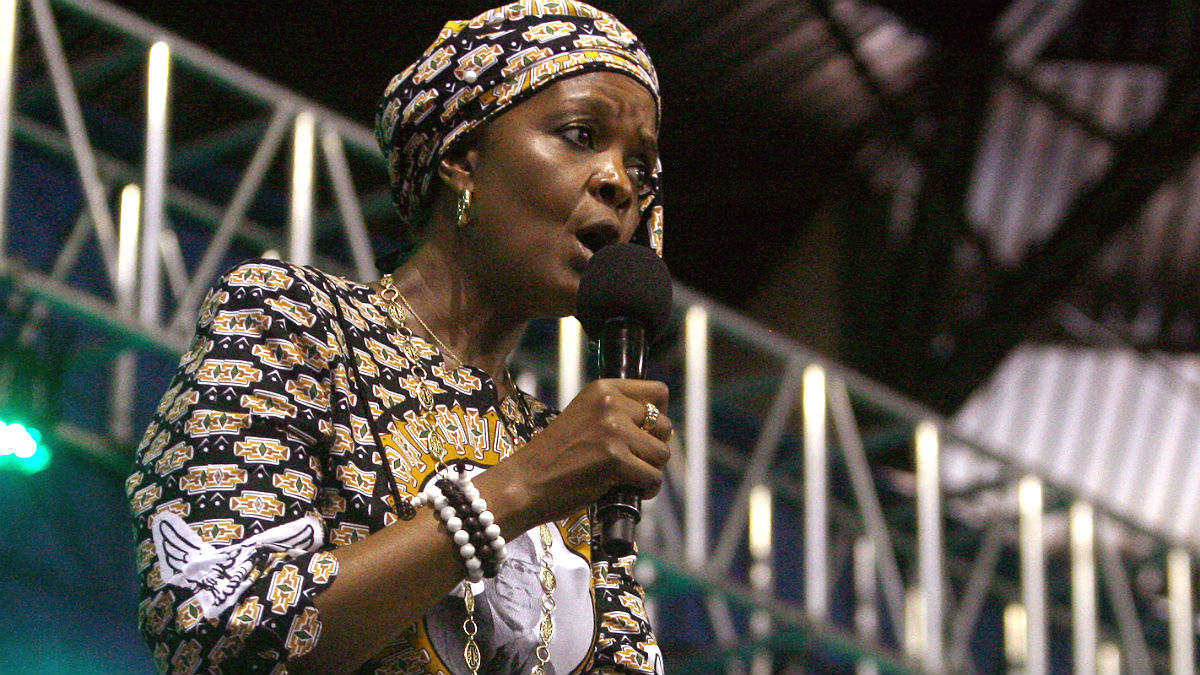
Grace Mugabe has become an increasingly vocal presence at Zanu-PF rallies (Jekesai Njikizana/AFP/Getty)
With Mujuru out of the picture, a new rift has emerged in Zanu-PF. Mnangagwa, who remains vice-president, is now fighting off a challenge from the faction known as Generation 40, or G40, which is backing Grace Mugabe to succeed her husband. The group includes powerful figures within Zanu-PF, including Mugabe's nephew, Patrick Zhuwao, politburo member Jonathan Moyo, and political commissar Saviour Kasukuwere.
In the past few months, as the struggle for control of the party has intensified, a new round of suspensions and counter-suspensions has begun. Senior figures from each camp have attacked each other in speeches and on social media.
Struggle for survival
Compared with Joice Mujuru, Mnangagwa is in a better position to maintain his grip on the vice-presidency. As minister of state security for eight years, minister of defence for another four and current head of the Joint Operations Command, he holds significant sway within the security forces, which have been key to Mugabe's own political survival.
He was also intimately involved with many of Mugabe's acts of terror. In the 1980s, for example, he led the Gukurahundi Operation in western Zimbabwe, in which 20,000 of the president's political opponents were killed.
By contrast, none of the G40 leaders fought in Zimbabwe's liberation struggle.
Any attempt to elbow Mnangagwa out of the succession race could therefore provoke senior military officers, who fear prosecution for past crimes when Mugabe's regime falls, to intervene on his behalf – with the potential to ignite a civil war.
That risk is growing, Zimbabwean insiders say, as Grace Mugabe begins to assemble military backing of her own.
Dr Maxwell Shumba, a former advisor to Morgan Tsvangirai and now leader of an opposition party called Zimbabwe First, says Robert Mugabe has handed control of the country's security forces to his wife.
"With sheer disregard to the country's constitution, the security structures swear allegiance to Mugabe and not to the country," Shumba says. "They were founded with the ultimate goal to guarantee everlasting political power for the Mugabe dynasty. The Mugabe state within a state – the president's office – is the power behind Grace Mugabe's acts of public bravado and her undermining of perceived adversaries."
Dewa Mavhinga, of Human Rights Watch, agrees. Mugabe "is purging long-time war-time allies in favour of his wife and those around her," he says. "Factional fighting will only end when a successor to Mugabe is identified, otherwise the fighting may very well mark the demise of the former liberation movement."
Threats and counter-threats
Despite Mnangagwa's powerful supporters, his own position is far from secure. Barely a week after he assumed his new position, cyanide was sprayed into his office, hospitalising his secretary, who arrived in the office before him.
The office has been broken into twice since December, and both incidents have been presented by the government as inside jobs. No arrests have been made, but information minister Christopher Mushowe has suggested that the break-ins were connected to the succession struggle.
"It's obvious that this is the work of the VP's detractors," he told a government-controlled newspaper. "It's true that there are officials plotting against him, but we don't know what they want to achieve."
Mushowe also implied that the vice-president's rivals will face consequences.
"Mnangagwa is a very mature man who has maintained his cool when he is unnecessarily attacked," he said. "We don't know how long he will maintain his cool."
Amid reports last week that Grace Mugabe had taken over the day-to-day running of Zimbabwe, the opposition People's Democratic Party said the risk of "a military coup, civil conflict or insurrection" was growing.
"The explosive nature of Zanu PF's catfights and the alienation of the war veterans will lead to one thing and one thing alone," it said. "Civil war and the unnecessary loss of precious life."
An economy on the slide
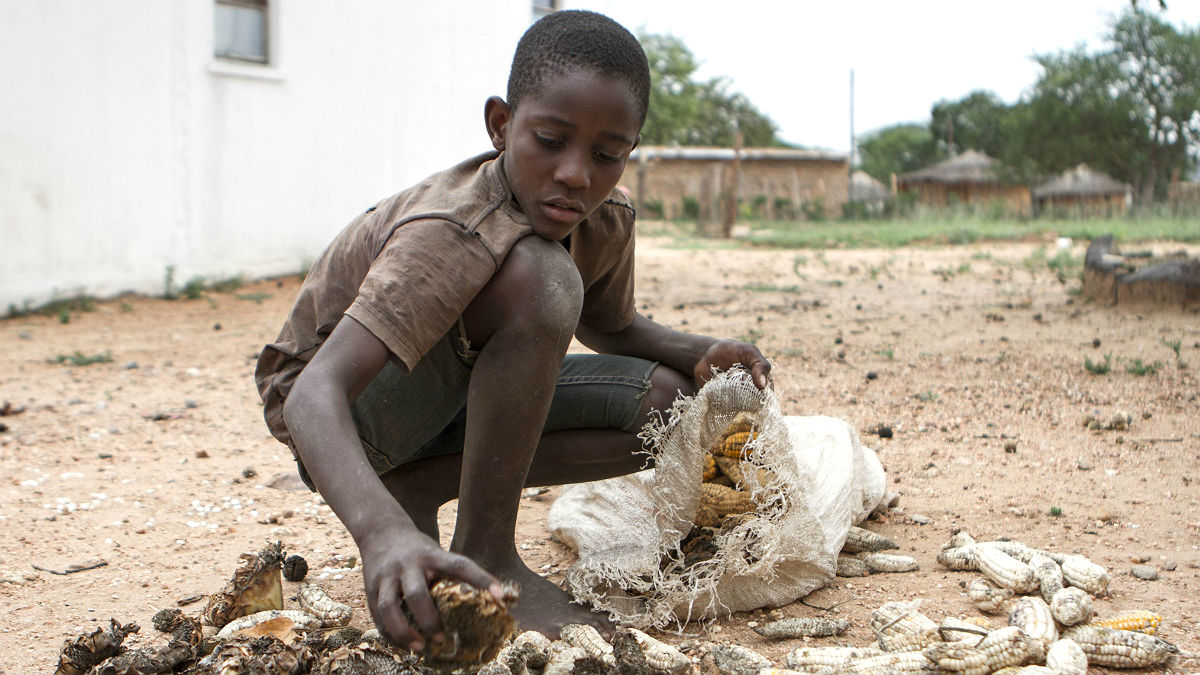
Poverty and drought have pushed many Zimbabweans below the breadline. In this picture taken on 7 February, 13-year-old Prince Mpofu gathers what remains of the harvest (Ziniyange Auntony/AFP/Getty)
For many Zanu-PF MPs, the business of government has played second fiddle to the struggle for political survival in the past few years. With ministers under constant threat of summary dismissal, many have spent more time shoring up their own positions – and plotting against their rivals – than seeking solutions to Zimbabwe's myriad problems.
One consequence is that the country's economy, which had shown signs of stabilisation under the unity government, is threatening to tip back into recession for the first time since 2008. Last May, on Twitter, information minister Jonathan Moyo offered this unusually frank assessment of the country's prospects: "Our triple challenge is we've workers without work, we've lost the sense of labour value and we lack a strategy to create wealth."
Agricultural production, which slumped when Mugabe ejected about 4,500 white commercial farmers from their land in the early 2000s, has worsened again in recent months as drought takes hold across southern Africa. Worse could be yet to come, with water shortages tightening as the country heads into its dry season.
Already, a quarter of the population is going hungry, Deutsche Welle reports, and more than 16,000 cattle have died of starvation in the past few months. This week, the Zimbabwean government asked international donors for more than £1 billion to help it import more grain, and Zambia banned grain exports to its neighbour as it too seeks to build up food stockpiles.
Beyond agriculture
While service industries have been showing signs of growth, other sectors of the economy have stalled. "Manufacturing and mining are struggling to cope with rising capital costs, a difficult business climate and a decline in external competitiveness," says the World Bank.
Many would-be investors have been put off by Mugabe's economic policies, and the wildly conflicting messages that have emerged from his ministers as they jockey for position.
Even the Indigenisation Act, a flagship Mugabe policy that forces foreign-owned companies operating in the country to cede 51 per cent of their equity to black Zimbabweans, has been the subject of public dispute.
In December, Patrick Chinamasa, the minister of finance, said that businesses would have up to 20 years to comply with the law, and those that did not could instead pay a non-compliance fee. Even as his statement was being welcomed by business leaders, it was contradicted by Patrick Zhuwawo, the minister for indigenisation – and a nephew of Robert Mugabe. He insisted that the policy had not changed, and suggested that Chinamasa's statement represented an act of disloyalty towards his leader.
"It was timed specifically when the president was out of the country, when the president had gone on leave," Zhuwawo said. "That to me appeared highly treacherous."
The policy itself – and deep inconsistencies in its presentation and implementation – continue to deter businesses from setting up shop in Zimbabwe.
Global headwinds
International economic trends, particularly the slowing of the Chinese economy and the resulting fall in commodity prices, are adding to Zimbabwe's woes. Its chief exports are gold, platinum and diamonds – all of which have been falling in value in recent years – and China is the country's biggest trading partner, and the funder of most of its infrastructure projects.
While China is yet to announce its commodity requirements for 2016, it has confirmed that it will not import more than it did last year. That will result in a reduction in its financial assistance to Zimbabwe.
Mugabe's budget is under severe economic pressure caused by dwindling exports: in 2014, the last year for which figures are available, its current account deficit stood at $3.1bn, only a little less than the record $3.4bn deficit it posted the previous year. It is therefore running out of money with which to bail out struggling businesses and government departments.
Passing on the costs
As it seeks new ways of raising revenues, the government has piled more pressure on ordinary citizens, the majority of whom are unemployed – most estimates put Zimbabwe's jobless rate at 60 to 80 per cent. Much of the population is supported by friends and families abroad.
Those without overseas contacts depend on informal cross-border trade, but that too has become more difficult. From 1 January this year, the government extended import duties to goods worth less than $300, a measure which the Zimbabwe Coalition on Debt and Development says will kill small businesses and fuel corruption at border posts.
Zimbabweans are also facing increasing electricity bills, despite many parts of the country often going for days without power. And motorists face an increase in speeding fines, with the maximum penalty raised to $100 – a third of the average worker's monthly salary.
Nor is there much hope of any imminent improvement.
"For the next year Zanu-PF will not have anything tangible to offer the people of Zimbabwe as their energy and attention is now solely and exclusively on succession politics and jostling for positions in a now imminent post-Mugabe era," says Dewa Mavhinga.
Poverty of opposition
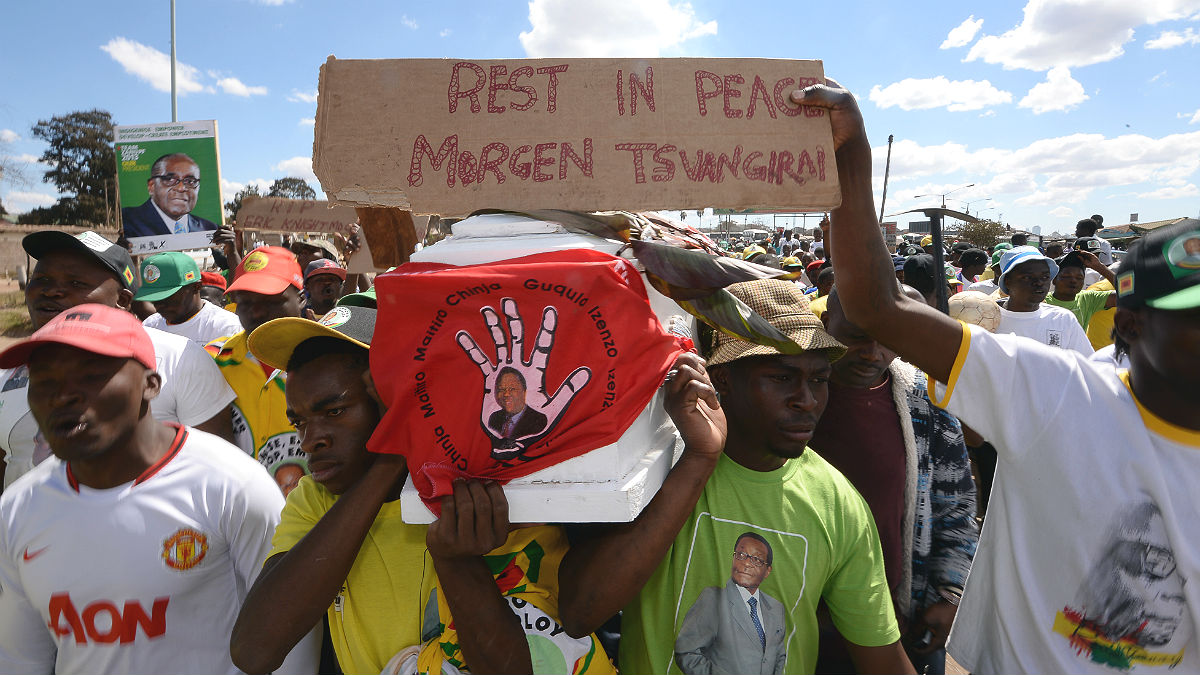
Zanu-PF supporters stage a mock funeral for Morgan Tsvangirai, who once almost toppled Mugabe (Alexander Joe/AFP/Getty)
A Zimbabwean proverb suggests that when two dogs fight over a bone, a third dog will take it away. But that has not proved true.
Opposition parties in Zimbabwe, which should have been able to capitalise on Zanu-PF infighting, have instead become even more scattered and confused. Rather than uniting to challenge a party that has shed more than half of its most powerful figures, the opposition – a disparate array of more than ten parties – has failed to agree a set of common goals.
Even a much-vaunted Grand Coalition of parties has so far failed to coalesce, due in large part to squabbles over leadership positions. Each party head wants to lead the new formation, despite many of their parties having little significance in the eyes of the electorate.
The closest the opposition has come to putting pressure on Zanu-PF was a well organised and well observed all-party boycott of the country's by-elections last year, in protest at Mugabe's refusal to introduce electoral reforms set out by the unity government before 2013. Opposition parties have also vowed not to take part in the 2018 general election.
Whether their protest results in change remains to be seen, but so far opposition action has been largely ineffectual.
Loss of faith
The failure of either the government or the opposition to improve the lot of ordinary Zimbabweans has led many to abandon all hope that their political system can be fixed. Many place more trust in their religious leaders, leading to a proliferation of prosperity churches, which base their teachings on the idea that faith in God – and donations to church authorities – can lead to financial reward.
A study by the International Republican Institute late last year found that Zimbabweans held churches in higher regard than secular institutions. Religious leaders scored a 38 per cent approval rating, significantly higher than police officers (17 per cent) and judges (14 per cent), who are widely regarded as instruments of Mugabe's government.
The threat of unrest
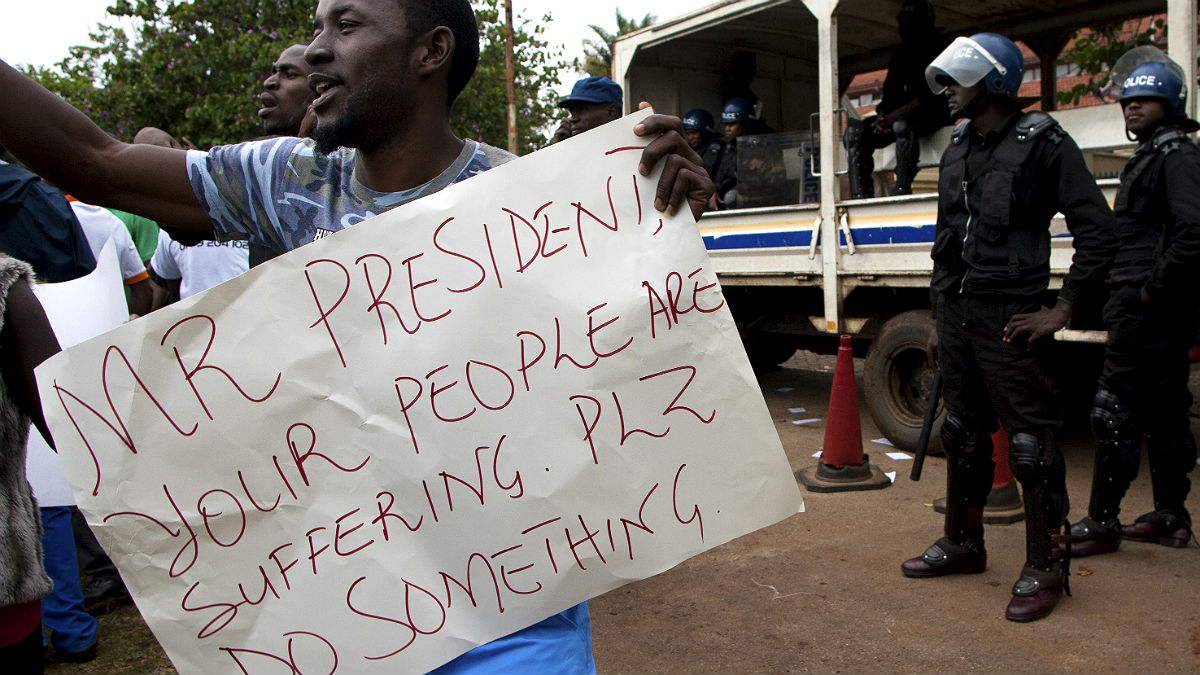
A protest in Harare in April last year. Grass roots anger is increasing in Zimbabwe (Jekesai Njikizana/AFP/Getty)
Despite the lack of organised opposition, signs are emerging that popular anger will not be contained for much longer. Poor service provision, and the non-payment of wages, may well provide a flashpoint.
Already, the energy and sanitation sectors are failing, with many parts of the country experiencing regular blackouts and water shortages. Apart from the inconvenience and frustration they cause, the outages also raise fears of a new cholera outbreak, like the one which killed more than 5,000 Zimbabweans in 2008, and which spread to South Africa and Botswana.
A yet more urgent problem for the government, however, is the difficulty it has paying government workers, who make up the vast majority of salaried staff in the country. At the end of last year, workers including nurses, soldiers and train drivers – as well as other state employees – were denied their December salaries, as well as annual bonuses. Pensions also went unpaid.
Although payments were made in January, most were slashed from the monthly average of $300. Some workers were given as little as $50 for the month. The government said that it does not know when and how it will pay civil servants after the end of this month.
Two weeks ago, finance minister Patrick Chinamasa said overdue army bonuses would be prioritised over those due to other state workers, in a move that was interpreted as an attempt to head off mutiny. In 2008, soldiers rioted when their payments failed to arrive.
"Chinamasa's decision to privilege the army will not surprise many," the Zimbabwean newspaper reported, "coming as it does at a time when the ruling Zanu-PF is rocked by divisions which, according to President Robert Mugabe, have also spread to the security services."
But in the absence of a united political opposition, trade unions have threatened to lead mass protests against the non-payment of their members. And given the government's history of using the police and army to crush public dissent, these protests have the potential to turn violent. Already there have been clashes between police and demonstrators: in January, officers fought running battles with minibus drivers angry about new speeding fines and, they say, the corrupt way in which they are enforced.
When, in an address to delegates at a Zanu-PF special congress in December, Robert Mugabe publicly admitted that the security forces were being torn apart along factional lines, he underlined the threat posed by the dissolution of his government.
Gabriel Shumba, director of the Zimbabwe Exiles Forum in Johannesburg, says a "form of conflict" is imminent. "We are likely to see a problem worse than 2008 unless something dramatic happens to stop us going to the brink."
Shumba also raised the prospect of the country dividing along tribal lines, noting that Grace Mugabe recently said that "no Karanga will rule the country" – an apparent reference to vice president Mnangagwa, a member of the Karanga tribe.
"The situation in Zimbabwe," Shumba said, "is a threat to regional stability."
The regional picture
South Africa and Botswana are already receiving a steady flow of migrants crossing illegally from Zimbabwe, some of whom are members of the armed forces, who have been deserting their jobs en masse. Unconfirmed reports suggest that desertions from the Zimbabwe National Army, the police and the prisons service, have been running at a rate of 9,000 per month since 2008.
In January, 35 members of the Zimbabwean special forces deserted and are believed to have crossed into South Africa, where Mugabe covertly deployed members of his specialist military police to track them down.
The flow of both civilians and soldiers is likely to increase, according to observers inside and outside Zimbabwe.
"The comatose economy will quickly give in and Zimbabwean refugees will flood neighbouring countries in their millions," says Farai Maguwu, director of the Centre for Natural Resource Governance in Harare. "This will trigger regional tensions, xenophobic attacks and will place a heavy burden on SADC economies, already reeling under one of the worst droughts in years."
Endgame
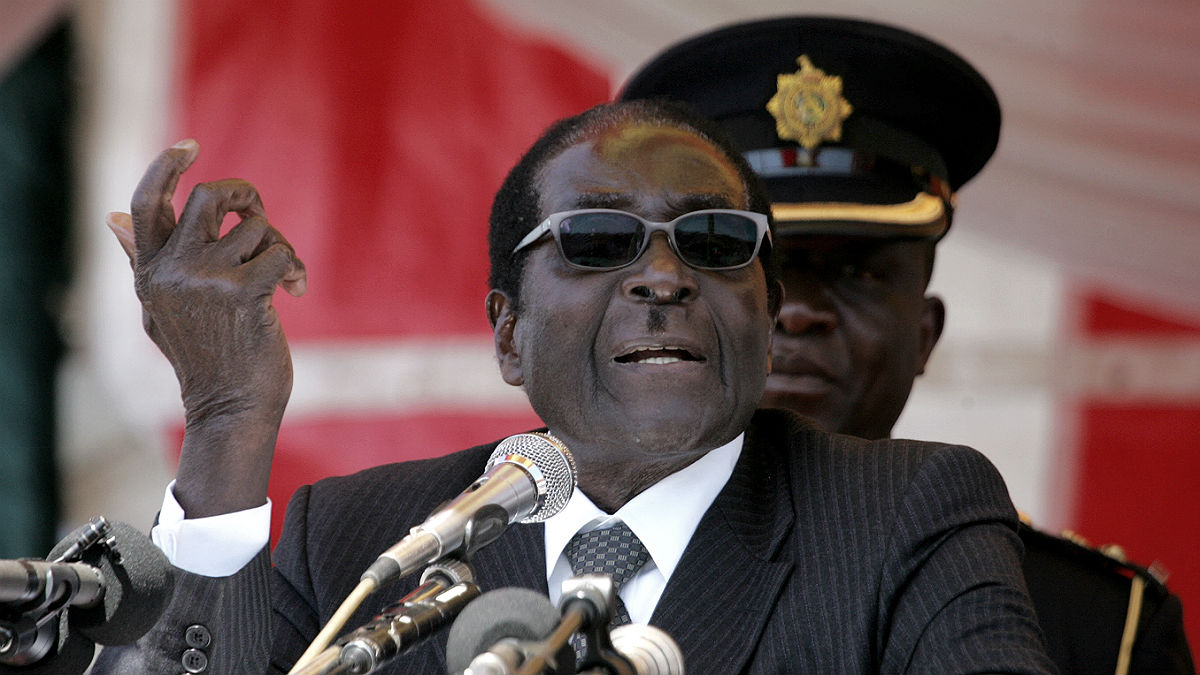
With Mugabe an increasingly frail presence, Zimbabwe is entering a dangerous time (Jekesai Njikizana/AFP/Getty)
Zimbabwe's predicament is now so intractable that it can no longer be solved by Robert Mugabe's resignation – or his death.
"Those who celebrate news of Mugabe's rumoured death are holding vanity celebrations," says Maxwell Shumba, Morgan Tsvangirai's former adviser. "They will be disappointed to learn that the current problems in Zimbabwe are now beyond the agenda of removing Mugabe."
Power is so deeply entrenched in "the Triage", says Shumba, referring to Mugabe, his Zanu-PF party and the government it controls, that the whole structure must be dismantled. "Until the Triage is effectively destroyed and a democratic system installed, Zimbabwe's political and economic problems will persist," he says.
Human Rights Watch's Dewa Mavhinga agrees. Mugabe could defuse the timebomb he has planted, Mavhinga says, but only by holding "credible, free and fair elections that will usher in a government with a fresh mandate [that can] focus on delivering results for the people of Zimbabwe".
That seems unlikely.
The "main shortcoming" of the opposition "is that they view Zanu-PF as a civilian party", says Shumba. "It's not a civilian party and as such demands for electoral reforms betray the political naivete within political ranks."
Other proposed solutions seem equally improbable. Opposition parties have called on the Southern Africa Development Community to intervene, either to force Mugabe back into a unity government, or to persuade him to leave office entirely.
"It is high time other liberation movements in the SADC and beyond stepped in to help Zanu-PF resolve its internal crisis," says Ngqabutho Mabhena, chairman of the Zimbabwean Community in South Africa. The ANC in South Africa, Flelimo in Mozambique and Swapo in Namibia are perfectly placed to "assist their sister party", he said.
But the SADC has proved reluctant to act against Mugabe, who is still revered across southern Africa for his role in ending white rule on the continent. Until last summer, Mugabe held the organisation's rotating presidency.
Nor is it clear that Mugabe would do what the SADC asked him. Though he rarely appears in public, his spokesmen insist that he is healthy and fit to govern. He remains Zanu-PF's candidate in the presidential elections scheduled for 2018, in which he may well stand uncontested.
Even if the fractured opposition does coalesce around a charismatic, competent leader who is yet to emerge, few people with knowledge of Zimbabwe expect that any single party, or any one faction of Zanu-PF, will be able to resolve the country's problems without significant struggle.
The big question now is whether that struggle will be political in nature – or military.